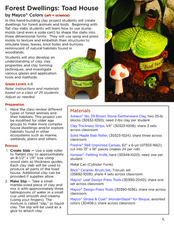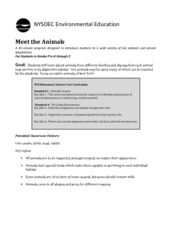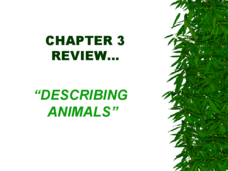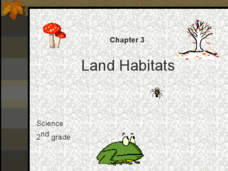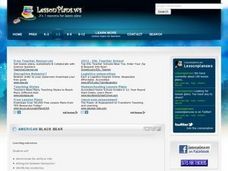Curated OER
Animal Rights Vs. Animal Welfare - Understanding the Issue
Students explore the difference between animal rights and animal welfare. They take a field trip to a farm to explore the producing animals for human use. After researching and collecting information from animal welfare/rights...
Curated OER
The Hat
Honing reading and communication skills through the theme of farm animals is the focus of this lesson. Students read a book about Scandinavian farm animals and complete prediction journal activities. They complete a worksheet about the...
Curated OER
Rain Forests: A Disappearing Act?
Students examine and locate rainforests on maps, and research the patterns of their destruction. They develop a bar graph of rainfall and temperature data, write a journal entry, and research the people, animals, and plants/products of...
Curated OER
Forest Dwellings: Toad House
What a great project to use as part of an exploration of animals or habitats. Learners design a clay model of a home for a forest animal. This could be a great way to cement what your class has learned about habitats.
Curated OER
Animal Nutrition
A rather uninspired powerpoint which covers all the information that is required to recap nutrition needs and metabolism but does not include any images or infographics. Some of the information is unusual and specialised to farm animals...
Curated OER
Australia
Using their discussion notes Middle schoolers engage in a series of learning centers. Each center focuses on a different aspect of Australian geography, history, government, culture, and natural environment. Activities are briefly...
Curated OER
Which Animal Lives Where?
Use this instructional activity in your classroom for a quick and easy way to review animal habitats. Young children use magazine clippings, pictures provided, or other resources to create a collage depicting an animal habitat. This is a...
Curated OER
Meet the Animals
The class will examine a series of live or stuffed animals in order to learn how different animals survive in distinctive habitats. As they examine each animal, they will be asked a series of critical thinking questions geared at getting...
Curated OER
habitat Powerpoint Project and Webquests
Using a provided PowerPoint template and a list of relevant web sites, 4th graders create an animal habitat presentation. This lesson plan includes relevant web sites, vocabulary, PowerPoint template, rubric and full lesson plan. This...
Curated OER
Animal Keynote Report
Learners produce a research project on an animal. Using the Internet, they find pictures and information about animals. They are also given a list of items that should be covered in their report, including the appearance of the animals,...
Curated OER
Animal Habitats: 1st Grade
Learning about animal habitats can be a lot of fun. This lesson focuses on how God created different habitats to suit different animal needs. Students will conduct library research in order to create a five page habitat slide show using...
Curated OER
I Know an Old Lady Who Swallowed a Fly
Preschoolers will love learning the song, " I Know an Old Lady Who Swallowed a Fly" with this PowerPoint. Each slide contains an image of an old lady and the animal she swallowed. Note: Audio does not appear to be working, however this...
Curated OER
Describing Animals
While a short review of animals and their classifications, this could be useful when discussing this topic in the classroom. There is a list of questions at the end to help review the main ideas. Reptiles, amphibians, and mammals are...
Curated OER
Animals and Plants: 1st Grade Science
First graders will have a better grasp on animal characteristics after viewing this presentation. The concepts covered are, skin, life cycle, offspring, size, and human/animal interrelationships. Note: This is good as a concept review or...
Curated OER
Is a bat a bird?
Provide a concise description of why a bat is not a bird by comparing their traits. This presentation defines both birds and flying mammals, explaining how they are similar and how they are different. Note: This PowerPoint is great for...
Curated OER
Science Types of Animals and Their Traits
Expose your students to the wonders of scientific vocabulary with this resource. Each slide contains a word and definition related to animal types and traits, concept vocabulary covered includes, traits, animal types, threatened,...
Curated OER
Land Habitats: Grade 3 Science
Build your students scientific vocabulary with this slide show on land habitats. Each slide provides a vocabulary word, image, and definition of a term common to habitats and the environment. Great for science class or as comprehensible...
Curated OER
All About Birds
In this birds learning exercise, students answer 25 short answer questions about birds. They color and label the different parts of a bird and fill in the correct term given the definitions.
Curated OER
Animal Characteristics
Students investigate biology by completing a group classification activity. In this animal characteristics, students discuss the different families in the animal kingdom and the small differences that separate the animals. Students...
Curated OER
American Black Bear
Learners analyze animal characteristics by creating an interactive presentation. In this black bear lesson, students identify the geographic location, characteristics and history of the American black bear by researching the web....
Curated OER
Academic Raceway: Animals
This animals PowerPoint provides a race car game in which students answer a variety of questions about animals, the majority of which are based on ways in which animals adapt to their surroundings and behave to survive.
Curated OER
Cell Structure
Students study plant and animal cell components. For this cell lesson students identify parts of a cell, view a PowerPoint presentation and diagram a cell.
Curated OER
Discovering the Wetlands!
Students name wetland plant and animal life. In this ecosystem lesson students go birdwatching and interpret native plants through art.
Curated OER
Flora and Fauna of the Hill Neighborhood
Students compare and contrast the characteristics of plants and animals. In this ecology activity, students observe the outdoors and describe the relationship among different living things. They relate plant diversity with animal diversity.





